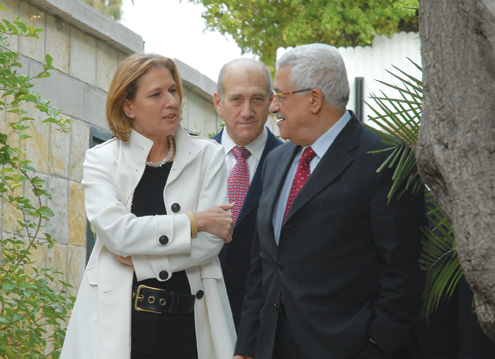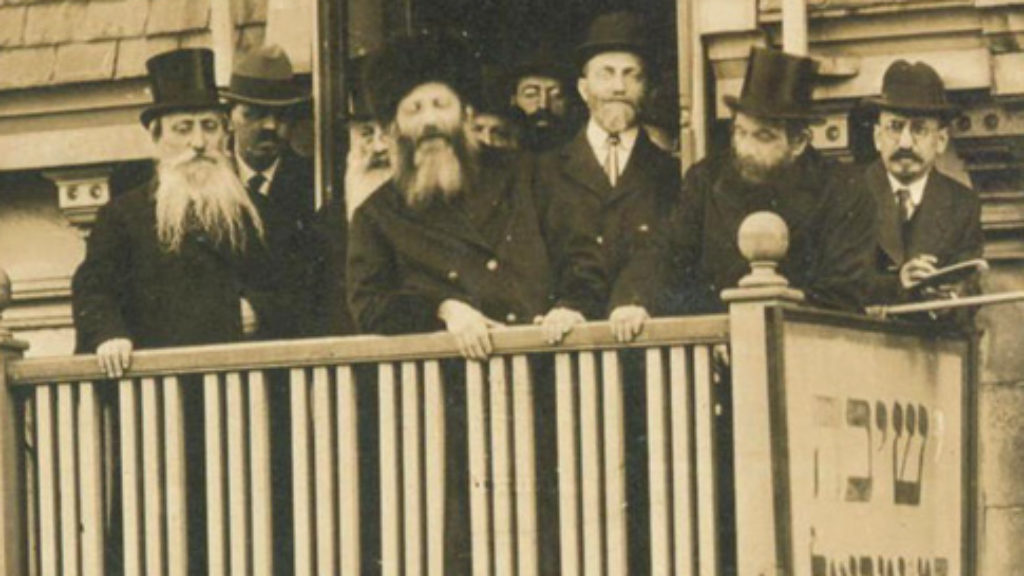Peace, Plan B
It is easy to blame the local players for Secretary of State John Kerry’s failure to really get the Israelis and Palestinians to the negotiating table, let alone to a final status agreement. Prime Minister Benjamin Netanyahu’s insistence on recognition of Israel as a Jewish nation-state did not make Kerry’s task easier, nor did continued construction on the West Bank. PLO Chairman Mahmoud Abbas, also called Abu Mazen, added another hurdle by making the talks dependent on the release of more and more Palestinians prisoners (that is, terrorists), and he never even considered facing up to the challenge of accepting Israel as a Jewish state, and so on. But the crux of the problem lies deeper, as even those who disagree most strongly with Netanyahu’s policies ought now to realize.

When Ehud Olmert, head of the centrist Kadima party, was prime minister, from 2006 to 2009, there were continuous negotiations with the Palestinian Authority for a final status agreement. Both sides came to the table with a commitment to a two-state solution, and the Labor Party, then headed by Minister of Defense Ehud Barak, was Olmert’s main coalition partner. Had the talks succeeded, it is conceivable that Olmert would still be prime minister, and the corruption charges against him might have taken a back seat. By the same token, if Abu Mazen could have presented his people with a peace agreement that resulted in the establishment of an independent Palestinian state in the West Bank and Gaza, he could probably have reasserted his authority over the separatist Gaza Strip, trumping his Islamist rivals in Hamas.
For almost two years, there were numerous meetings, at the highest level, between the two sides: In an unguarded moment during a live TV interview several months ago, Olmert blurted out that he had 36 (or 37, he didn’t exactly remember) meetings with Abu Mazen without arriving at an agreement. To argue—as he subsequently did on that occasion—that what they needed was “just a little bit more time” is preposterous: If 36 (or was it 37?) meetings could not produce an agreement, then something more fundamental must have been involved.
With all of the goodwill and the not inconsiderable amount of trust between the two sides, and despite some initial readiness to make some significant concessions, when the negotiators addressed the core issues, the gap between even the most moderate Israeli government in years and the more moderate Palestinian faction (Abu Mazen’s Fatah) remained deep and apparently unbridgeable. The most intractable problems were borders, settlements, Jerusalem, 1948 refugees, and, finally, security.
On borders and settlements, the Palestinians insist on Israel withdrawing to the 1967 armistice lines (the “Green Line”). They are willing to accept some limited territorial swaps, but anyone looking at the map can see that this does not solve the question of the future of Israeli settlements in the West Bank. Now that there are a quarter of a million Jewish settlers in the area, some of whom have been there for 20 or 30 years, even the most long-time and adamant Israeli opponents of the entire settlement project realize that it would be extremely difficult for Israel to return to anything like square one. There is, moreover, no precedent for a democratic country evacuating between 5 percent and 7 percent of its own population from a contested area as part of a peace treaty. Hence whenever Olmert and Abu Mazen, or their deputies Tzipi Livni (then foreign minister) and Abu Ala (Ahmed Qurei, a leading Palestinian negotiator) approached this issue, it became clear that an agreement was beyond their reach.
The mantra of “Jerusalem as the capital of both states” has a nice ring to it, but it is utterly chimerical. There is no city in the world that serves as the capital of two different states, much less of two states that have been embroiled in conflict for the better part of a century. With some 200,000 Israeli Jews now living in Jerusalem on the other side of the old Green Line, where exactly would one draw the border? How would one avoid a situation in which every automobile accident, every burglary, homicide, or neighborhood quarrel could spawn an international incident that could turn into a casus belli? Ideas of granting some sort of international status to the “Holy Basin” of the Old City appear equally out of touch with reality. Which international body would ultimately have authority? The UN (with a Russian and Chinese veto in the Security Council)? The EU? UNESCO? The last case of an internationalized entity of this sort was interwar Danzig—and it turned out to be part of the problem, not part of the solution.
Equally well-intentioned talk about an area “without sovereignty” or under “God’s sovereignty” appears, when examined closely, to be either sophomoric or utterly nonsensical. Even ideas of leaving the holy places under the jurisdiction of the religions that lay claim to them is, to say the least, impractical. Who will represent the Christians: the Vatican, the Orthodox Church, or the Geneva-based Council of Churches? One has only to look at the centuries-old conflict among various Christian denominations at the Church of the Holy Sepulcher to realize how naive such pious notions are. No wonder that whenever the negotiators even tiptoed up to these issues, they quickly ended up running away from them as if from a wildfire.

The Palestinians view the right of the refugees from the 1948 war and their descendants (al-houda) to return as the cornerstone of their national narrative, something they can never abandon. Sometimes they also refer to it as an individual entitlement of each of the refugees, a matter that cannot be abrogated by any political agreement. To do justice to the Palestinian position, one should add that they occasionally acknowledge that not all of the six million who claim to be 1948 refugees or their descendants will return to Israel. But every Israeli—Right and Left—understands that the Palestinian aim is to use demographics to put an end to Israel as a Jewish nation-state, and hence no Israeli government will ever accept it. It is certainly difficult for the Palestinian leadership, which has for more than 60 years taught all Palestinian children in refugees camps that they will someday return to their ancestors’ homes and properties in Israel, to give up such a deeply ingrained and emotionally powerful claim. But it must be abandoned if one really wishes to achieve a historical reconciliation between the two national movements. As former German Foreign Minister Joschka Fischer once observed, if Germany had insisted that 12,000,000 ethnic German expellees (and their descendants) from Poland, Czechoslovakia, and Hungary had a “right of return” to their former homes, there would never have been peace in Europe. Fischer himself, by the way, came from a family of ethnic Germans expelled from Hungary after World War II.
Deeply aware of Israel’s security needs, even the center-left government of Olmert, Livni, and Barak insisted that the future Palestinian state be demilitarized and that Israel be allowed to retain a military presence in the Jordan Valley, with some overflight, entry, and exit rights in the West Bank. Netanyahu made similar demands in his Bar-Ilan speech when he, for the first time, accepted the idea of a two-state solution. While these considerations are shared by most Israeli doves, they understandably enough appear to the Palestinians to be a serious encroachment upon and emasculation of the sovereignty of their future state.
These are the intractable problems that prevented Olmert and Abu Mazen from reaching an agreement. None of these obstacles has disappeared since 2009—on the contrary, some have become more formidable. There are now more than 300,000 Jewish settlers on the West Bank, and Hamas is apparently well-entrenched in Gaza and remains explicitly opposed to negotiation and committed to Israel’s destruction. The recent agreement between the Palestinian Authority and Hamas has yet to be implemented—and three such previous agreements suggest how unstable it is likely to be—but it certainly doesn’t help. Nor does it seem that a Netanyahu government, locked in a coalition with Naftali Bennett’s ultra-nationalist/religious Jewish Home (Bayit Yehudi) party, will be able or willing to make the Palestinians a more generous offer than that made by Olmert and rejected by Abu Mazen.
What is to be done? Something can be learned from recent national conflicts in Cyprus, Bosnia, Kosovo, and even Kashmir. All of these are, like the Israeli-Palestinian conflict, multifaceted. They all have a territorial dimension, but they are also conflicts between contending national movements and between conflicting historical narratives and memories. They all involve military occupation, resistance, terrorism, brutal reprisals, ethnic cleansing, settlement activities; they are not religious conflicts, but all have religious aspects that exacerbate the conflicts and make reconciliation and compromise even more difficult.
In all of these conflicts, peace negotiations aimed at final status agreements have failed. In Cyprus, the Annan Plan has failed because one group, the Greek Cypriots, rejected it. In Bosnia, the Dayton Accords have stopped the killing, rape, and ethnic cleansing, but failed to achieve the multi-ethnic, multi-confessional, multi-layered confederative structure that their authors envisaged. In Kosovo, the Kosovar Albanians have achieved the independence they deserve, but Serbia has not acknowledged it, and so the conflict has not yet been solved. And—in all these cases—American involvement, diplomacy, and pressure have failed to overcome the fundamental disagreements that divide the contending parties. This is the moment to stop and consider if, after decades of trying, the international community has failed to solve the problems of divided cities such as Nicosia or Mitrovica, does it really have the wherewithal, or chutzpah, to imagine that it can solve those of Jerusalem, which are tenfold more complicated?
What can be learned from all of these unsolved conflicts is that, in the absence of a final status agreement, partial solutions can be found: limited agreements, unilateral steps, confidence-building measures. In international studies jargon this is sometimes called “proactive conflict management.” A Turkish decision to open the crossings in Nicosia did not solve the Cyprus conflict, but it did help lower the temperature on the divided island. European-Union brokered agreements in Kosovo concerning municipal arrangements in Serbian-dominated towns and villages have not solved the Kosovo problem, but have helped to alleviate tensions and nudge the situation a little bit closer to a possible future agreement.
Something similar can be tried in the Middle East as well. We could use some proactive conflict management, a series of partial steps on the part of the Israelis as well as the Palestinians. In short: a Plan B. Such measures should not be viewed as an alibi or alternative to a final status agreement, but as a series of stopgap measures for a very large gap. For the Israelis, this might entail a quiet, de facto commitment not to enlarge existing Jewish settlements; it might require the Palestinians to refrain from their symbolically powerful but politically pointless attempts to reach statehood via the UN. If they think creatively, both sides could come up with many more such steps. No doubt, the effort will be painful, but less painful than a total collapse of relations. And who knows? We might even get somewhere, even if progress proves very, very slow. Still, such progress would be real, unlike the totally utopian hopes raised and dashed over the last 20 years of attempts to reach a final status agreement through concessions that neither party is willing or able to make now.
Comments
You must log in to comment Log In
Suggested Reading

On Literary Brilliance and Moral Rot
Why did the prestigious publishing house Gallimard want to publish three vilely anti-Semitic pamphlets by Louis-Ferdinand Céline? And is he still worth reading?
Jewish Identity and Its Discontents
Two philosophies—one analytical, the other amorous—of the modern Jewish condition.

Dialectical Spirit
A new intellectual biography explores the thought and legacy of Rabbi Abraham Isaac Kook.

Return without Returning
In Micah Goodman’s new book, The Wondering Jew, he argues that Israeli Jews should develop a relationship with Jewish tradition that falls somewhere between strict adherence and total abandonment.
aanhang
Sounds like a realistic approach. Might take several lifetimes to achieve, though, and who is willing to wait that long? Meanwhile, if the new President moves the U.S. Embassy to Jerusalem, the Arabs might get the message. Problem is, they have never been allowed to lose a war and are of the belief that the U.S. Cavalry will always come to their rescue to save them. On that basis, the Arab youth will continue to wait for the day when Israel is driven into the sea and they can come with their keys to reclaim the land. That is the myth they live by, and their history books and leaders reinforce it!